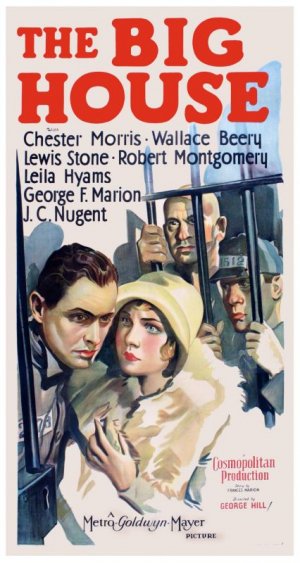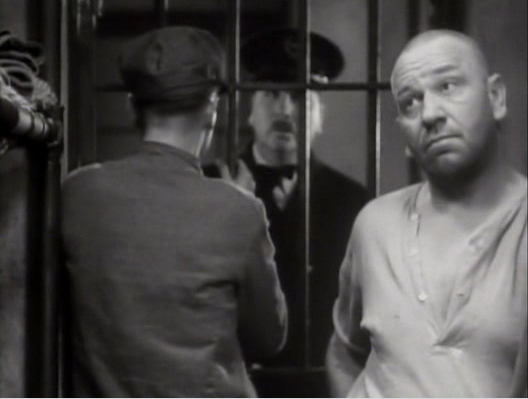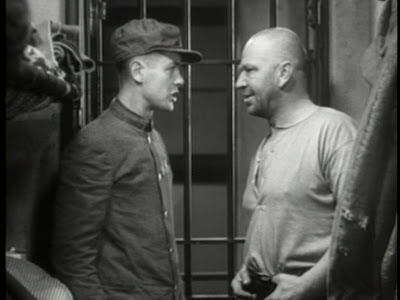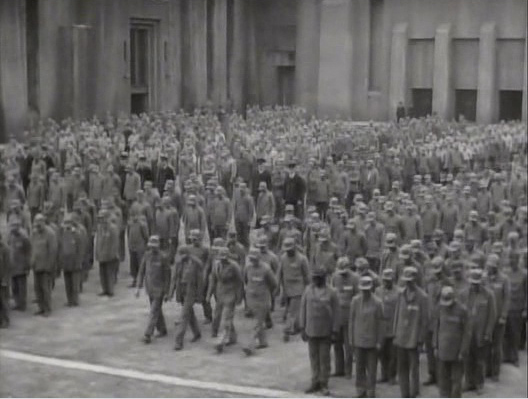George Hill’s early prison drama, The Big House, boasts a good cast of tough inmates, played by Wallace Beery, who was nominated for an Oscar as the murderer Butch, and Chester Morris, who was not.

Frances Marion, who was then married to Hill, won the Writing Achievement Oscar, as the Screenplay Award was called then, thus becoming the first female to achieve such a distinction, and for a decidedly “male genre.”
While the story and dialogue were written by Marion, with additional dialogue by Joe Farnham and Martin Flavin. The scenario was inspired by journalistic coverage of prison riots and federal investigation in 1929. Producer-director George Hill wrote a story treatment, ” The Reign of Terror: A Story of Crime and Punishment,” which MGM head of production Irving Thalberg then assigned to Marion.

“Big House” offered a good role for Wallace Beery that helped to define his screen image as a tough but lovable slob. Beery, whose role was originally cast with the great silent actor Lon Chaney who died suddenly, lost out the Best Actor to British thespian George Arliss in “Disraeli.” He would win the Best Actor Oscar for playing the boxer-father in the melodrama, “The Champ” (1932).

By standards of the time, the film’s climax, a violent jailbreak, was scary as well as impressive.

The film was a huge commercial hit: Made on a budget of about $400,000, it earned $1.7 million in rentals (over $3 million in box-office receipts).

The Big House was also shot simultaneously (using the same sets) in other languages, such as French and Spanish.
Afterwards, MGM cast Wallace Beery as the romantic interest of one of studio’s biggest stars, Marie Dressler, in the upcoming Min and Bill.
Oscar nominations: 4
Picture, produced by Irving Thalberg
Writing Achievement: Frances Marion
Actor: Wallace Beery
Sound Recording: Douglas Shearer
Oscar awards: 2
Writing Achievement
Sound Recording
Oscar Context
For the 1929-1930 achievements, The Big House competed with four other films for the Best Picture Oscar: “All Quiet on the Western Front,” which won, the biopic “Disraeli,” the Norma Shearer romantic vehicle “The Divorcee,” and the operetta “The Love Parade.”
Detailed Synopsis
Kent (Robert Montgomery), a drunk driver who carelessly kills a man, is sentenced to 10 years for manslaughter. In overcrowded prison designed for 1800 and actually holding 3000, he is placed in cell with Butch (Wallace Beery) and Morgan (Chester Morris), the leaders of the inmates. Butch is alternately menacing and friendly, while Morgan tries to help out the frightened, inexperienced youngster, but Kent rebuffs his overtures.
When Butch is ordered into solitary confinement for sparking a protest over food, he passes along his knife before, which ends up in Kent’s hands. Prior to a search of their cell, Kent hides the knife in Morgan’s bed. When it is found, Morgan’s parole is canceled, and he is put in solitary as well. He vows to make Kent pay for that.
When Morgan is let out of solitary, he escapes by switching places with a corpse on the way to the morgue. He makes his way to the bookstore run by Kent’s sister Anne (Leila Hyams). She manages to get his gun and starts to call the police, but then changes her mind. Morgan (attracted to Anne ever since he saw Kent’s photo of her) gets a job and becomes acquainted with Anne and her family. They all like him, but he is caught and sent back to prison.
Butch tells Morgan of his plan for jailbreak on Thanksgiving. In return for a promise of freedom, Kent informs the warden (Lewis Stone), though he is not privy to the details. Despite warnings the inmates succeed in taking over the prison, capturing guards, though they are unable to force their way out. Butch threatens to shoot the guards one by one unless they are allowed to escape. When the warden stands firm, Butch shoots the warden’s right-hand man in cold blood, then tosses the dying man out.
Army tanks are called to break down the entrance. Morgan grabs a pistol from the prisoner assigned to watch the guards. He finds Kent cowering with the guard but spares him. Kent panics and flees before Morgan locks the guards in to save their lives. When Kent tries to open the front doors, he is killed in the crossfire.
Butch is then told that Morgan was the “stoolie” who tipped off the warden. In the ensuing gunfight, both are wounded, Butch fatally. Before he dies, he learns that Kent was actually the informer, and he and Morgan reconcile.
In the incongruent happy ending, Morgan is given full pardon for his efforts, and when he exits the prison, Anne is there for him.
Foreign Language Versions
In the early sound era, it was common for Hollywood studios to produce “Foreign Language Versions” of their films using the same sets and costumes. The French, Spanish and German-language versions of The Big House have survived. They are entitled “Révolte dans la prison,” “El presidio” and “Menschen hinter Gittern.” The French and Spanish versions are available with the original in triple set from the Warner Archives.
Cast
Chester Morris as Morgan
Wallace Beery as Butch
Lewis Stone as Warden
Robert Montgomery as Kent
Leila Hyams as Anne
George F. Marion as Pop
J. C. Nugent as Mr. Marlowe
Karl Dane as Olsen
DeWitt Jennings as Wallace
Mathew Betz as Gopher
Claire McDowell as Mrs. Marlowe
Robert O’Connor as Donlin
Tom Kennedy as Uncle Jed
Tom Wilson as Sandy
Release date: June 24, 1930.




